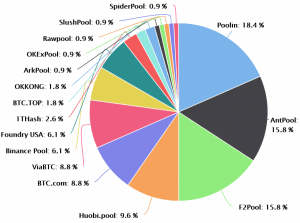The global Bitcoin (BTC) hashrate, or the computational power of the network, will spread from China to the rest of the world – which is a redistribution beneficial for Bitcoin, according to Alejandro De La Torre, Vice President at Hong Kong-headquartered major mining pool Poolin.
Many miners are actually looking to move from China – the home of over 50% of all global hashpower – and spread across the world, particularly Europe and North America, De La Torre said during Coindesk’s Consensus event today, adding that “the next great miner migration will be from China into the rest of the world.”
As reported, the Chinese government recently promised to “crack down on Bitcoin mining and trading activities,” as well as “prevent and control financial risks.”
Crypto exchange Huobi has already suspended its crypto mining services and sales of mining equipment in mainland China, saying it will instead focus on overseas businesses, but adding that “most users will be unaffected by this change.” Reports also emerged that other mining pool players including HashCow and BTC.TOP are also reviewing their operations in China as a response to central government pressure on the mining sector. Meanwhile, China-based Bitcoin mining company BIT Mining Limited said it has entered into a binding investment term sheet with a Kazakhstan-based company to jointly invest in a cryptocurrency mining data center in this Chinese neighbour.
BTC hashrate distribution among mining pools on May 24:

According to De La Torre, the reason why mining grew so quickly and to such an extent in China is the combination of “two right ingredients” both connected to the rapid growth of a number of the country’s industries:
- every component a mining rig requires is manufactured in China;
- hydroelectric power plants spread across the country, which then enabled the miners to use this type of energy.
Another notable element, per De La Torre, is China’s rainy season, when, driven by the cheaper costs of hydroelectricity in certain regions, miners pack up their entire business and move – particularly to Sichuan, known as a Bitcoin mining hub.
And while there is a lot of debate currently over Bitcoin’s power consumption and the so-called ‘green BTC’, De La Torre argued that “over 50% of mining in China is in fact renewable.”
_____
Learn more:
– Bitcoin Mining Council: Promotion, Cabal, Attack on BTC, or Pointless?
– Analysts See ‘Seismic shift’ In Bitcoin Mining Amid Chinese ‘Crackdown’
– Moving to Green Bitcoin May be Moving To a Two-Tier Bitcoin
– Green Investments Help Bitcoin Miners Amid Possible Regulatory Crackdown
– Proof-Of-Bitcoin Needed As Critics & Competitors Unite To Play Climate Card
– A Closer Look at the Environmental Impact of Bitcoin Mining
Credit: Source link






















